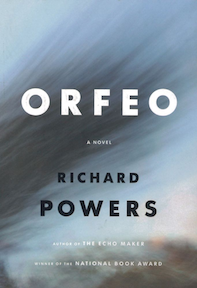By Daniel Catalanello
In Richard Power’s Orfeo, the struggle of one man’s life-long undertaking to comprehend the impossibly ephemeral and mercurial nature of music is placed in fitting counterpoint to the story of classical music’s development throughout the 20th century. While the novel focuses on unfolding the story of Peter Els—failed composer turned do-it-yourself chemist—Powers additionally explores the many mutations that academic music has undergone over the past century, touching on the lives of key composers like Mahler, Shostakovich, John Cage, and others. The parallels between Els’ life and artistic progress in the 20th century sheds light on weighty concepts like the importance and meaning of art and artistic progress, all while avoiding pretension or over-simplification. Powers excellently balances the story of Els’ dream of artistic satisfaction, and the extremes he will go to for the sake of his art, with the rollicking and grand story of music’s gradual metamorphosis over the course of a tumultuous and artistically adventurous century.
Part of Powers success is in relating impossibly big concepts, such as those involved in Els’ lifelong desire to create the kind of music that might stand alongside the greatest works of Bach, with very personal and human themes that reveal Powers is a writer of incredible emotional intelligence. Over the course of the novel, Powers takes Peter Els through many twists and turns, realistically presenting a man who is finely detailed and also ever elusive, much like the music Els spends his life admiring. Powers interweaves the key episodes of Els’ past with the central narrative focused on an elderly Els who finds himself perilously flirting with bio-terrorism, of all things, for a final act that not even the bold musical experimentation of John Cage could have predicted.
Powers balances this high-stakes story with the often riveting and resonant tales of various composers. In this way, the novel successfully blends fictional narrative with the very real, and equally strange, stories of the artists who once stood at the vanguard of music’s cutting edge. It is immediately apparent that Powers has a rich and multi-faceted understanding and appreciation of these artists and the works they have passed down, as Powers enjoys the rare gift of writing fantastic fiction while also wielding intricate knowledge of music, both in a technical and emotional sense. Readers with in-depth knowledge of music theory and history, as well as those with only a casual interest, will surely find much to admire about this novel. In Orfeo, Powers has created a work that functions as a testament to the beauty and power of great fiction as well as great music.
Daniel Catalanello is a senior at Louisiana State University majoring in English literature and Classics. Louisiana State University is home to the Iota Tau of Louisiana chapter of Phi Beta Kappa.
Richard Powers became a member of Phi Beta Kappa at the University of Illinois at Urbana-Champaign in 1977.




